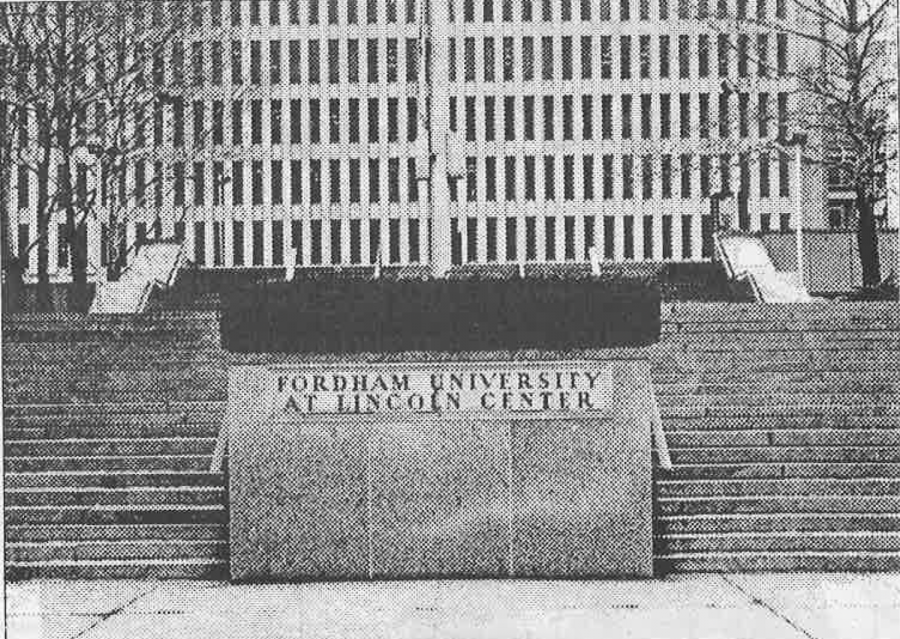What Was the Board of Advisors?
The Story of FCLC’s Most Influential and Secretive Alumni Group
FORDHAM OBSERVER ARCHIVES
The Fordham Lincoln Center Campus has gone through a number of changes since it was founded in the late 1960s. The Board of Advisors was one element of continuity from 1989 to 2019.
October 16, 2019
For more than 30 years, the Dean of Fordham College at Lincoln Center (FCLC) was advised by a group of influential Fordham alumni. Four times a year, the members of this board — ranging between 10 and 30 any given year — would meet at Fordham’s campus in Manhattan. Several would fly in from other states to attend these meetings, where they would provide the dean with their opinions, resources and hopes for Fordham College at Lincoln Center.
According to the Rev. Robert Grimes, S.J., the dean of Fordham College Lincoln Center from 1997 to 2018, the board consisted of dozens of high-profile professionals and philanthropists over the years. The board was never intentionally secretive, but they did prefer to operate with some level of personal privacy and have chosen not to release their names to the public.
“We had people from every possible industry on this board,” said Delia Peters, former chairwoman of the Board of Advisors and FCLC ’85. “It was just a very diverse board. We did get perspectives from everything and everybody.”
Many of the Board’s members were invited to join not just because of their professional achievements, but because of their personal tenacity in completing their degrees as well.
Nicholas Zennario, FCLC ’87, completed his degree as a nontraditional student. “I graduated high school in 1959,” said Zennario. “The last thing I wanted to do was to continue my education because of the horrible experience that I created for myself in high school.”
Zennario went straight into the workforce after high school, joining the European American Bank. After 20 years, he was named the vice president of the company. Despite the fact that Zennario was working a full-time job in banking while he was enrolled in classes, he graduated cum laude.
His story, while inspiring in its own right, was typical of members of the Board. “At least half of them were nontraditional students themselves,” said Zennario. “So they understood what life at Fordham at Lincoln Center was like, and how we could help make that life more attainable for … students in need, for example.”
The Board has been around for 31 years, dating back to the late 1980s, said Grimes. At this time, Rev. Joseph A. O’Hare, S.J., was the University President and Will Tanksley was the Dean of Fordham College at Lincoln Center.
According to psychology professor Frederick Wertz, former interim dean of FCLC, the Board was formed to help sustain the college.
“They were formed in a time of turbulence, when the college and even the university was struggling to sustain and enhance itself,” said Wertz. “I think they have played an incredible role in kind of their understanding of the college and their passion and dedication to the college was really crucial in supporting the college as Fordham has evolved.”
The Board contributed to the enhancement of the college through the creation of various programs and helped to finance developments in FCLC throughout its existence. Over the years, this included creating the Fordham/Ailey BFA program partnership, founding Quinn Library and, most recently, creating the Fashion Studies minor.
“There would be no Ailey/Fordham BFA in dance without the Board,” said Peters. “Nor would there be the BFA scholarship benefit, nor the Dean Denise Jefferson Award.”
“The reason Quinn Library is “Quinn Library” is the Board of Advisors,” said Grimes. “When Jerry Quinn died, they wanted to do something to honor him, and they suggested they rename the library after him. The President of Fordham said ‘Well, if you raise a hundred thousand dollars, we’ll name the library after him,’” said Grimes. “They went out and they raised the hundred thousand dollars. The library ever since has been Quinn Library.”
According to Wertz, at each meeting, a guest from the college would join to inform the board on “crucial” happenings within the college and ask for feedback, but also learn more about what students had been up to since the last meeting.
In addition to their contributions to the entire college, according to Grimes, the board also helped individual students in a variety of ways. Networking, for example, was something Grimes did not consider a “primary goal” of the board, but he admitted that they did so quietly.
“They served as mentors to people who wanted to get into a particular industry in New York, and I would fix them up and they would introduce them to people and that sort of thing,” he said. “But there was no big thing, we didn’t talk about the Fordham College Board of Advisors ‘advising program’ or anything like that.”
The Board was also a resource for Dean Grimes to “soundboard” ideas. Peters could recall several times that they had advised Grimes, as well as several other administrators, during tough decisions.
“I want to emphasize that during my years as dean, I found them very valuable and a very big help to things,” said Grimes. “But I think a lot of people think that the only reason you have a board like that is to raise money. And if they’re not coming up with large amounts of money then there’s no point.”
While they were not created to fundraise for the University, the Board still contributed significant amounts of money to the college, in several cases paying off students’ tuition after circumstances had changed.
“There was one guy who graduated a couple of years ago,” said Grimes. “He was gonna have to drop out. And (a Board member) paid his junior and senior year tuition. He won a Fulbright,” said Grimes.
Zennario mentioned that he and his wife were also very passionate about helping students attend the University. “A number of years ago, we saw fit to endow a scholarship at Fordham University in our name, specifically earmarked for minority students.”
Grimes also told the story of another board member, a young woman who was still early in her career, who once used a vacation day at work to spend several hours making phone calls and talking to other alumni to raise money on Fordham’s giving day. “Without her, we wouldn’t have raised much,” he said. “But she took to those phones and we raised… a good amount.”
Grimes had one thing he would change about the Board, if he could have. “I think one of the unfortunate things, and I think I might have done this differently if I could go back and do it over, was that the board was very quiet. They didn’t trumpet what they did, but they did an awful lot,” said Grimes. “I would hate for anybody to think that they were do-nothing board. They really did quite a bit.”
Update Oct. 28, 2019: A previous version of this article erroneously stated that Fordham University had a “Sustainable Fashion Studies minor.” The official name of the program is the “Fashion Studies minor.” The article has been corrected with this information.











